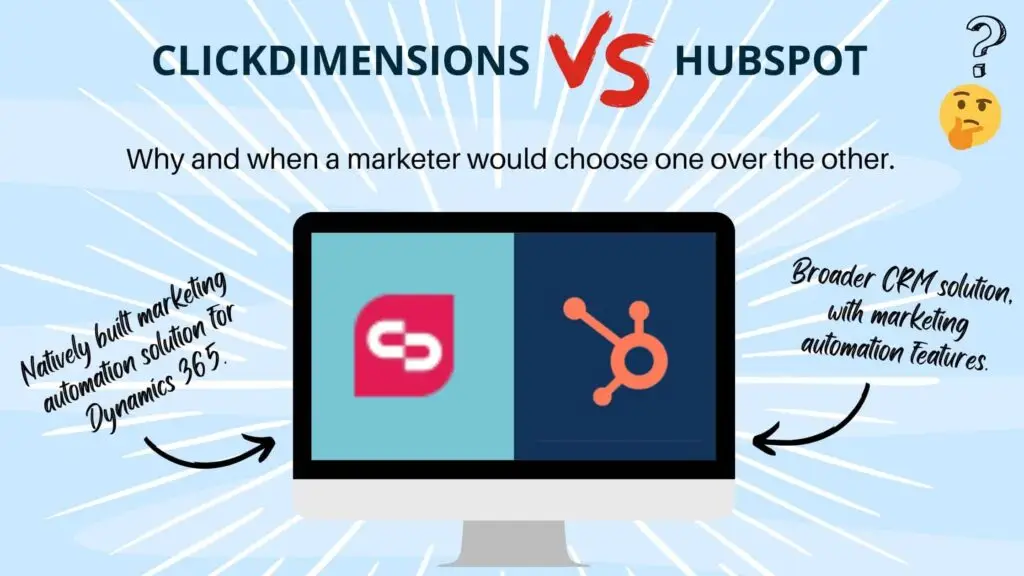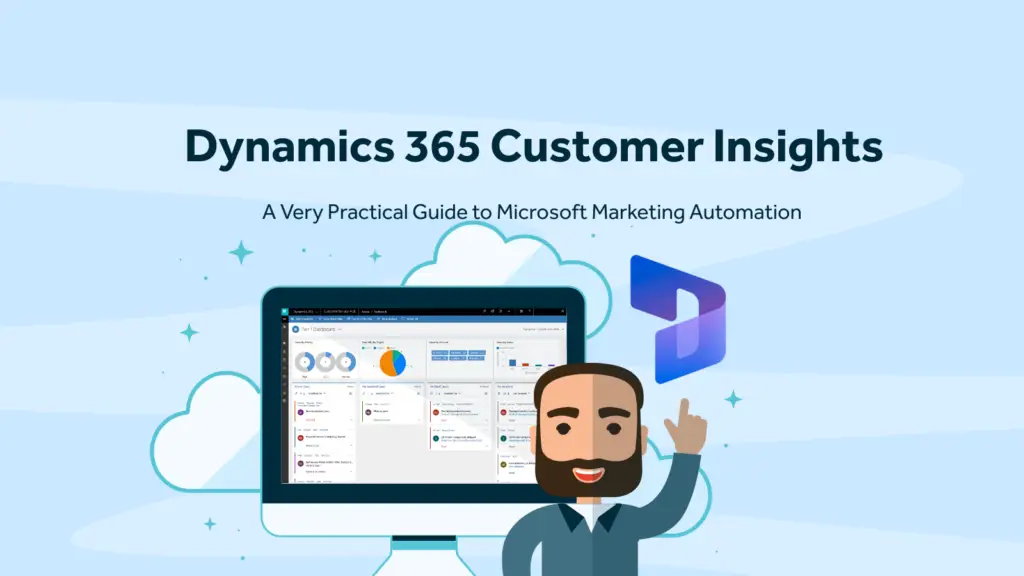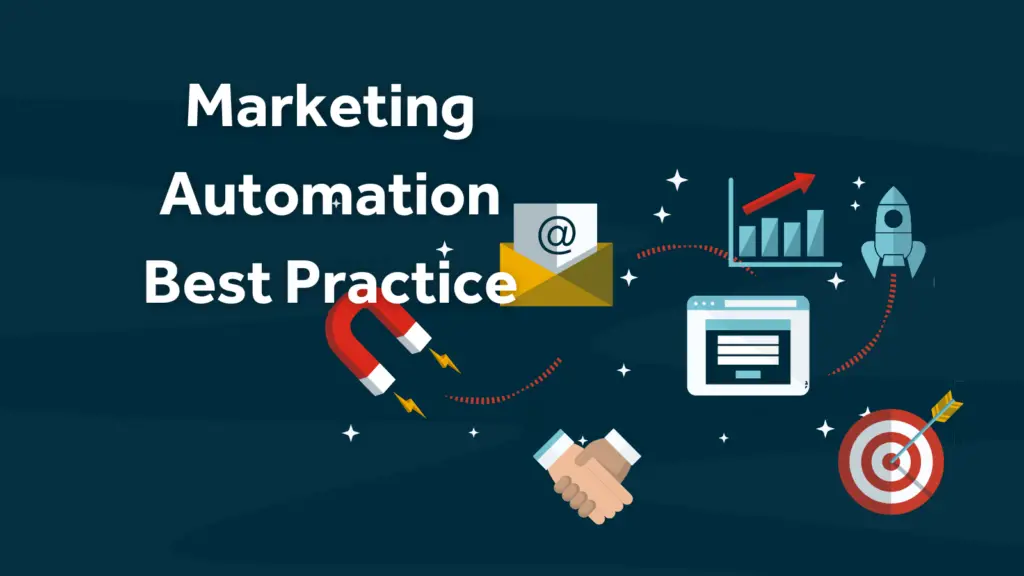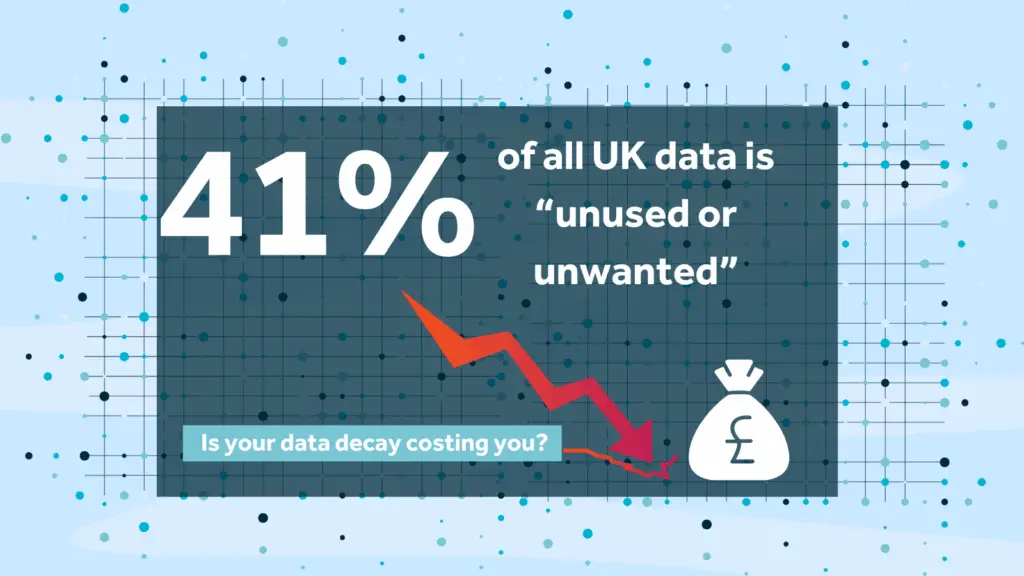There’s no doubt that the marketing software market is booming, meaning marketers are spoilt with choice when it comes to email and marketing automation tools to help them deliver timely and tailored comms to customers and prospects. This choice can have its benefits, but it also means it can be a bit of a minefield navigating through options and comparing products. Every business is different, and every marketing department has its own unique attributes and needs, so software that might suit one business a marketer has previously worked for may not be suited to the next business they move to.
From our experience, a good chunk of clients are familiar with HubSpot when first approaching us. They have either heard of its capabilities or have practical experience in using it themselves, so we thought we’d compare the two products to help you with your purchasing decision. You’ll find this an especially useful article if you’re a Microsoft Dynamics 365 user.
Marketing automation solution vs a broader CRM platform
First and foremost, the clear distinction between these two products is that Click is a marketing automation software solution that seamlessly integrates with Dynamics 365 CRM. In contrast, HubSpot is a CRM that also includes marketing automation and CMS tools. Its broad scope means it benefits a broader proportion of a business if all modules are adopted. However, a company can select just one module if they wish and connect it to other databases using API technology. We’ll explain how HubSpot does that later on.
This module approach of HubSpot can suit smaller businesses that can choose the off-the-shelf tools and solutions that best suit their needs. And it also offers free and basic plans – making it very appealing for start-ups and small SMBs. However, as we explain, this pricing model can have its drawbacks as a business gains in size. And could be off-putting to the ambitious.
Click is also ideal for SMBs, and as they are the marketing cloud solution for Microsoft Dynamics, not only do they offer powerful marketing automation tools. They have the benefit of high-level Dynamics 365 knowledge and offer social marketing tools, data insights with Intelligent Dashboards and professional marketing services for those that require expert direction and additional support.
HubSpot may be the preferred choice for businesses looking for a broader ‘catch all’ CRM platform with additional marketing automation solutions. This is often suited to start-ups and small SMBs. However, this ‘Hub’ model can be confusing and cost more overall. In many instances, businesses end up with an overbaked and overpriced solution for what they need, as their Hub packages aren’t that flexible. Not surprisingly, this causes frustrations with marketers. As who wants to pay more for features they don’t require?
A perfect example of this is with survey tools. If they want to use surveys, they have to buy marketing automation and CMS hub or bring in a third-party vendor to offer the survey tool to the marketing automation solution.
In comparison, the Click’s survey tool is accessible as part of the standard ClickDimensions package. That is more cost-effective, more convenient and a smoother user experience overall.
The benefit of a natively built solution.
Click Marketing Automation is built natively, with zero data-syncing and no IT resource required, meaning time saved and a smoother and hassle-free experience. Technical support is given from the get-go. Customers can also call upon consultancy support to help them align their marketing automation activity to their wider digital marketing goals to get the most from the software. So, for Dynamics 365 users, this is a perfect fit marketing automation solution.
With HubSpot, an API connector is used to sync accounts, contacts, leads and opportunities. Although there is onboarding support for a short period, generally around four weeks, the free and starter plans don’t offer onboarding services, meaning new customers have to figure out using this connector themselves with no support. An important matter to highlight is that this connector does not synchronize campaign entities. Meaning rich campaign data insights don’t move over to the mother CRM (if the client is a Dynamics 365 user, say) everything the company does in campaigns stays in HubSpot, and it is not possible to bring it back over to Dynamics, resulting in two data sources, meaning the Microsoft Dynamics CRM will no longer be the single source of truth anymore. This can also throw up additional challenges if a business wants to analyze sales and marketing data to understand nurturing activity and the buying cycle.
Why is one source of data truth important to an SMB?
For SMBs, a CRM is a massive investment in time and money. Running marketing automation software that doesn’t seamlessly integrate is not only poor disjointed data management, it means managing two very different systems, resulting in two separate costs and separate maintenance. One of the biggest negatives is also how lack of integration impacts reporting. For example, a customer may use BI to get data from Dynamics 365 and want to create a campaign report on recent marketing activity, but this isn’t possible using Dynamics 365 CRM and HubSpot together, as the reports would run separately in both systems. That means the marketer loses powerful insight and intelligent segmentation based on user behaviour, and the buyer journey is lost.
Another issue with HubSpot is that the marketing lists are not synced when utilized alongside Dynamics 365.
Microsoft integration is a major benefit to clients for seamless data integration when it comes to Click. You will get the most from your Microsoft Dynamics 365 CRM when your marketing automation tool works seamlessly alongside it.
Click pricing Vs Hubspot pricing
Click offers an entirely different pricing model to HubSpot. The former offers onbaording to all clients, email bundling flexibility and simple pricing that does not get hung up on the size of data being managed by the customer.
HubSpot, however, is focused on the number of contacts. If you want to buy more emails, then you are having to buy more contacts to be able to send out those emails. Managing the pricing is not straightforward and this can be a headache for SMBs with smaller budgets.
This consumption-based pricing model can have its drawbacks. For businesses who want to grow their data pots, and who doesn’t right? Then this can be off-putting. This is especially dangerous for businesses that have longer buying cycles and longer customer lifecycles. Trimming data pots to control costs in this way is not only tricky to manage but detrimental to business growth.
With HubSpot, as soon as you start to get over 5000 contacts, the price elevates quickly and becomes cost-prohibitive, and that’s before adding any extra features. For many SMBs, 5,000 can be a very small number when thinking about customers and leads combined.
Comparatively, Click is far more flexible and scales better as the client grows, the main reason being that there are unlimited users and contacts, allowing marketing and growth without constraints.
The support and services
Comparatively, they are very similar. Click’s main differentiator is its data services. Data services are incredibly important to an SMB, especially those who want to leverage their data, and this is where Click comes into its own. For businesses that have ambitious growth plans and need additional support to help map that out Click is perfectly suited to assist in this consultative way.
The HubSpot on hand support services are much more technical and less execution-based. Relying on their partner network to deliver the execution element and marketing delivery, however, ClickDimensions is the other around, offering a great execution-based level of support, and Click is typically more technical. HubSpot doesn’t have the same knowledge of the Microsoft 365 ecosystem as ClickDimensions, meaning they may know their own CRM well but could come across stumbling blocks when it comes to troubleshooting.
Click partners offer a great technical aspect, but with HubSpot, partners are delivered by marketing agencies, so they are responsible for delivering marketing services with little IT, technical or consulting capabilities. This is often wrapped up in a retainer-based model for providing that partner service.
One major differentiator for HubSpot is their impressive self-serve solution through the HubSpot Academy, which offers a very comprehensive self-service learning platform with a vast array of learning modules. From general marketing to more tools and feature specific content. But the onus is on the customer to get up and running themselves.
When to choose Click over HubSpot
To summarize, here are the top 3 reasons customers choose Click over HubSpot:
- Better customer insights via native integration with Microsoft Dynamics CRM
- It is a cost-effective marketing automation solution with unlimited users and contacts.
- Scaling up is easy for growing businesses with no uncomfortable price rises, or restrictive or over-baked packages.
Click is the preferred choice when the customer is looking for the best experience using Microsoft Dynamics 365, thanks to the seamless integration. It offers a robust and powerful marketing automation option that is far more future proof than HubSpot for the reasons mentioned above. Overall, the customization and power of Microsoft Dynamics and ClickDimensions combined are unrivalled.
When to choose HubSpot
HubSpot is a solution suited for those looking for a broader CRM solution, not solely a marketing automation tool.
Purely from a marketing perspective, if you’re an SMB looking at content creation, want to create a blog and are more advertising focused, or are not attached to your Microsoft Dynamics 365 CRM, then HubSpot will suffice. Also, the free or basic plans can work just fine for some start-ups. Though HubSpot is great at offering basic free packages, as soon as that tool begins driving value and proving useful, the cost can start to stack up rapidly.
If you know you’re not going to require much technical support and your team is quite self-sufficient in getting to grips with features and tools, HubSpot is a great option, thanks to the HubSpot Academy.
Final comments on Click versus HubSpot
Both software solutions hold their merits, but they are very different products built on different models. We would say that if you are a Dynamics 365 user or you’re considering moving to Dynamics, then Click is, without a doubt, the perfect, seamlessly integrating option. If you don’t use Dynamics and you have no desire to in the future, then HubSpot could work just fine for you. Just be aware of the scaling up limitation if you’re going for growth.
If you’re undecided about Dynamics 365, read this additional article to help weigh that option up.
Should you need additional advice, or have more questions, do feel free to contact our very helpful team.
ABOUT ROCKET CRM
Rocket CRM is a Microsoft Dynamics 365, and a platinum Click accredited partner, helping small to medium-sized businesses and charities harness the power of scalable CRM technology. Our mission is to make powerful CRM software simple with custom-built, user-focused solutions.
Website: rocketcrm.co.uk
Podcast: RocketPod
Social: LinkedIn




